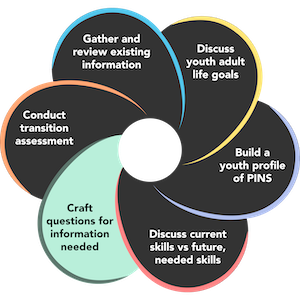Age-Appropriate Transition Assessment Planning Guide
Tools for Answering Unanswered Questions
After questions are identified, how does a team know what transition assessment tools and strategies to use?
Teams choose assessment tools and methods that will 'answer' the assessment question that is posed. This is the activity of Question Five.

The nature of Transition Assessment is ongoing and a bit like 'peeling an onion' - answering the first set of questions leads to the next, deeper layer of questions. Using tools and methods to gather the targeted information can prevent spending time and resources on assessment tools and methods that will not provide information useful to planning for that youth's transition. Instead new questions are posed that assessment data can address. Selection of tools is addressed in the final Question 5.
Identification of the important transition assessment questions for a youth then focuses the transition assessment plan. The plan becomes a more time and resource efficient process and the resulting information is more individualized and useful for transition planning.
This website is a library of curated age-appropriate assessments and transition and employment resources for educators working with transition-aged youth in Ohio schools. Viewers can choose to navigate this site by using the horizontal menu or the site map that displays internal pages alphabetically.
Educators and families will find formal and informal assessments designed to answer a variety of questions the youth and their team may be exploring. These resources include general assessments for educators, families, and students; assessments for post-secondary employment, college, and independent living; and assessments for health and medical concerns.
This is a tool regarding the Career Discovery process and includes examples of career discovery profiles, information about conducting a career discovery team meeting and a variety of ways to gather information about an individual to assist in employment planning.
"Skills to Pay the Bills: Mastering Soft Skills for Workplace Success," is a curriculum developed by ODEP focused on teaching "soft" or workforce readiness skills to youth, including youth with disabilities. Created for youth development professionals as an introduction to workplace interpersonal and professional skills, the curriculum is targeted for youth ages 14 to 21 in both in-school and out-of-school environments. The basic structure of the program is comprised of modular, hands-on, engaging activities that focus on six key skill areas: communication, enthusiasm and attitude, teamwork, networking, problem solving and critical thinking, and professionalism.
A tool to be used when documenting a student's work experience. It can help job coaches focus their notes on certain skills and also allow for team members from different agencies or departments capture similar information and capture across settings.
